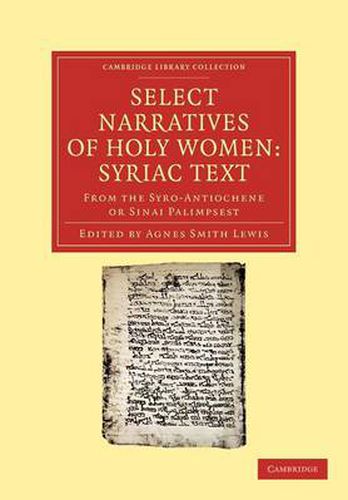Readings Newsletter
Become a Readings Member to make your shopping experience even easier.
Sign in or sign up for free!
You’re not far away from qualifying for FREE standard shipping within Australia
You’ve qualified for FREE standard shipping within Australia
The cart is loading…






The sisters Agnes Lewis (1843-1926) and Margaret Gibson (1843-1920) were pioneering biblical scholars who became experts in a number of ancient languages. Travelling widely in the Middle East, they made several significant discoveries, including one of the earliest manuscripts of the Four Gospels in Syriac, a dialect of Aramaic, the language probably spoken by Jesus himself. Their chief discoveries were made in the Monastery of St Catherine on Mount Sinai. This fascicule, a useful resource for scholars of Syriac, and originally published as part of the Studia Sinaitica series, is the text of a Syriac manuscript from the monastic library at St Catherine’s. Transcribed by Lewis and first published in 1900, the manuscript recounts the tales of a number of saintly women including Pelagia, a rich courtesan who converted to Christianity, and Eugenia, a holy woman who lived as a man and became the abbot of a monastery.
$9.00 standard shipping within Australia
FREE standard shipping within Australia for orders over $100.00
Express & International shipping calculated at checkout
The sisters Agnes Lewis (1843-1926) and Margaret Gibson (1843-1920) were pioneering biblical scholars who became experts in a number of ancient languages. Travelling widely in the Middle East, they made several significant discoveries, including one of the earliest manuscripts of the Four Gospels in Syriac, a dialect of Aramaic, the language probably spoken by Jesus himself. Their chief discoveries were made in the Monastery of St Catherine on Mount Sinai. This fascicule, a useful resource for scholars of Syriac, and originally published as part of the Studia Sinaitica series, is the text of a Syriac manuscript from the monastic library at St Catherine’s. Transcribed by Lewis and first published in 1900, the manuscript recounts the tales of a number of saintly women including Pelagia, a rich courtesan who converted to Christianity, and Eugenia, a holy woman who lived as a man and became the abbot of a monastery.